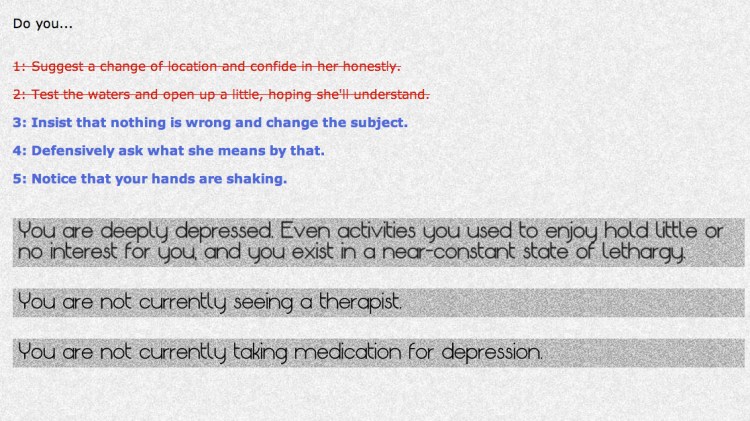With no fanfare or even a press release, the interactive fiction game Depression Quest has released on Steam. The PC and Mac game is now live and free to download.
Its release couldn’t be more timely, given that beloved actor and comedian Robin Williams died yesterday. Williams suffered from depression and the Marin County Sheriff’s office suspects his death was “a suicide due to asphyxia.”
The news of Williams’ death broke “literally minutes” after independent developer Zoe Quinn received notification that Depression Quest, where players assume the role of a character suffering from depression and have to cope with everyday life, got launch approval on Steam. Quinn, who suffers from depression herself, was unsure whether to go ahead with the release.
She took to her personal blog to explain why she decided to click the launch button.
“I know there may be a worst case of people assuming the launch somehow is trying to capitalize on tragedy,” Quinn said. “However, I would rather have those people hate me than the people who are currently quietly suffering with this illness sit at their dinner tables tonight and hear the discussion of today’s news, hear people not understand how someone who had so much could kill themselves, and lack a resource they could have needed right then to point to and say ‘this is why.’
“If I was sitting down across a table from someone who asked me, ‘How could you release the day Robin Williams took his own life?’ I would know how I could answer. I’d know why I did it, even if I felt conflicted about doing it. But if I sat down across from someone who asked, ‘How could you hold back on releasing this game when I needed it?’ I would feel ashamed.”
Quinn explained that she never wanted people to see Depression Quest as “just” a game.
“I get regular emails from therapists who use it with their patients and families of depression sufferers to build a dialog and a bridge to understanding,” Quinn said. “It’s been used in classroom settings, people have played it with their parents and significant others to start showing them things they had a hard time verbalizing.
“Not taking those stories and those people seriously and accepting the role that this game was able to play in their own massive undertakings of self-care would be disrespecting those people’s struggles. And I can’t do that.”
Both times Quinn put Depression Quest on Steam Greenlight — part of Valve’s online store where the community votes on which games deserve a full Steam release — she received “threats and harassment,” including a very disturbing phone call: “I couldn’t make out what was happening at first,” Quinn told Edge magazine. “Then I realized it was somebody jerking off.”
Despite this, Quinn insists she will deal with whatever fallout comes her way from this release.
“I’d rather have people flood my inbox with threats again and call me a monster,” said Quinn, “if it means that one person who was shocked by today’s news and maybe thinking of trying to reach out and get help could use this tool I’ve made to take the vitally important first steps towards clawing their way out of the hell that is this disease.”
While Depression Quest is free, players can pay what they want for the title, with part of the proceeds going to charity.
VentureBeat's mission is to be a digital town square for technical decision-makers to gain knowledge about transformative enterprise technology and transact. Learn More


